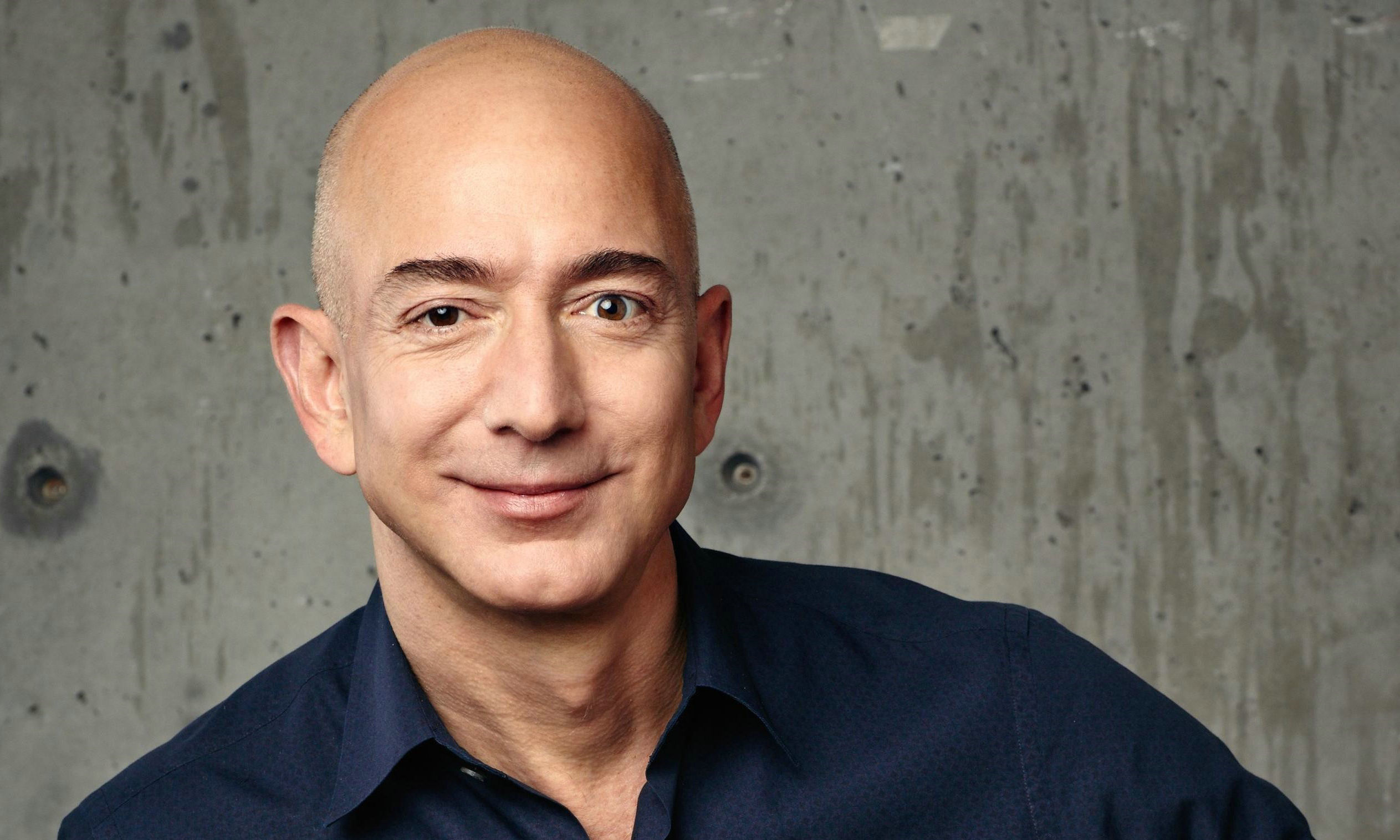In a remote corner of the Philippines, a scrawny boy with dusty feet raced down unpaved paths, his eyes gleaming with aspirations and a spark of defiance. This boy would grow up to become Manny Pacquiao, a figure etched in the annals of boxing history. This account takes you on a journey into the heart of this boxing emperor, weaving vivid tales, factual data, and incisive analysis to unravel how he rose from destitution to the pinnacle of world boxing, becoming a hero to many.
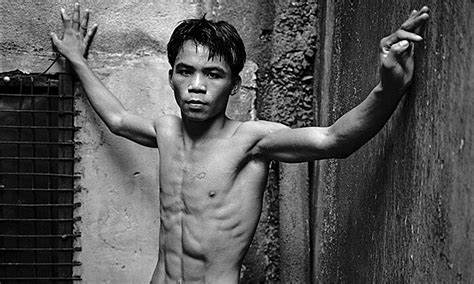
[Opening: Where Dreams Take Root in the Slums]
"I was born in a place where we fought for survival every day," Manny Pacquiao reminisces about his upbringing. Born in 1978 into a family struggling to meet even the most basic needs, with numerous siblings and scarce meals, often limited to one a day, Pacquiao learned resilience and defiance early on, acutely aware of life's hardships.
"I sold doughnuts, collected bottles for a pittance," he recounts of his pre-teen years. While other children slept, he navigated markets, hawking goods or scavenging for recyclables. These experiences honed his resolve, teaching him observation and adaptability, skills that later translated into ring acuity and strategy.
Television was a luxury, but when chances arose, Pacquiao would be among the crowd, fixated on boxing matches. It was here that his fascination with the sport sparked. "Watching boxers fight in the ring, I wanted to be like them, to change my destiny," he says. Amidst adversity, he mimicked moves from TV, practicing with worn-out sacks, dreaming of a grander stage.
Family was both sanctuary and adversity for Pacquiao. His mother's unconditional love and encouragement contrasted with his father's sternness, teaching him toughness. "Mom always said to respond with kindness, even when life is unfair," he shares. This familial warmth fueled his optimism, converting into drive in the ring.
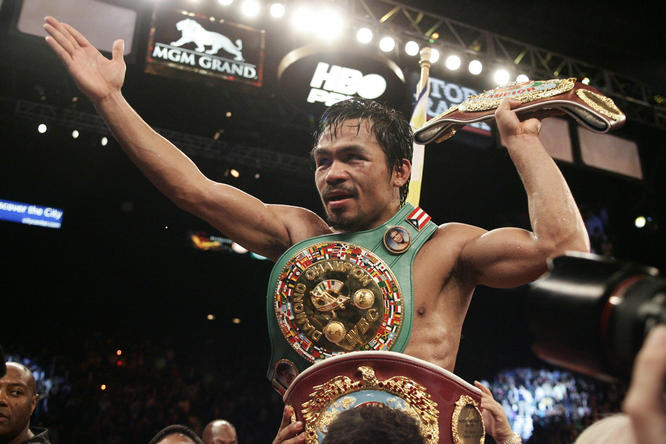
[The Pivot: Emergence in the Ring]
"I found myself in the ring, my battlefield and redemption," Pacquiao said of his turning point in 1995, at just 16. Once a street urchin, he stumbled into a boxing gym, setting wheels of fate in motion. Unheralded and slender, his eyes burned with ambition.
His professional debut in 1996 ended in defeat, but it ignited his resolve. "Failure is a stepping stone; I never shy away from it," he declared. Over the next few years, he quietly excelled in the Philippines, winning match after match, honing technique and strength.
1998 marked a crucial pivot. Pacquiao earned a shot at the WBC Flyweight World Title against Mexican champion Leonardo Garcia. An underdog, he stunned the world with a fourth-round TKO victory, becoming the youngest Filipino boxing champ. "I fought not just for myself, but for my country and all the poor," he emotionally stated post-match.
Pacquiao's rise between 1996 and 1998 was transformative, both technically and spiritually. He evolved from street fighter to tactical genius, leveraging speed and nimble footwork to compensate for physical disadvantages. Most importantly, his indomitable spirit became his greatest weapon, inspiring spectators worldwide. Following his triumph, Pacquiao's story of perseverance spread across the Philippines and globally, cementing his status as a hero to millions.
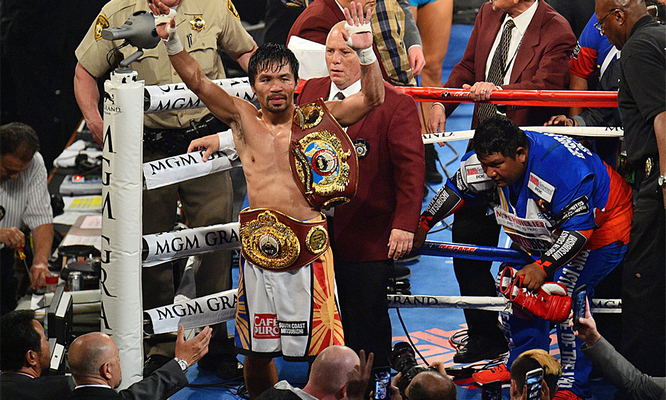
Peak Moments: The Timeless Legend of a Boxing King
"I fear no opponent, for I trust in my training and determination." – Manny Pacquiao. By 2001, Pacquiao was no longer a novice but a multi-title world champion in the boxing arena. That year, he leaped up a weight class to challenge Mexican great Marco Antonio Barrera, marking the dawn of his lightweight reign. This victory not only demonstrated Pacquiao's technical versatility and physical prowess but also showcased his fearless spirit.
In 2003, Pacquiao's cross-divisional conquest reached new heights as he moved up to welterweight to face former champion Juan Manuel Márquez. What was anticipated as a clash of skill versus power culminated in a resounding win for Pacquiao, reinforcing his multidimensional talent and elevating him to a national hero in the Philippines. "I aimed to prove that I could be the best in any division," Pacquiao lived up to his pledge through action.
If there is one bout from Pacquiao's career that lingers in public memory, it is the 2008 "Dream Match" against Oscar De La Hoya. Dubbed the "Fight of the Century," it captivated global attention and shattered box office records. Pacquiao's lightning speed and pinpoint accuracy led to an eighth-round TKO, fortifying his rule in the ring and hoisting the Philippine flag high on the international stage. "This fight was for the Philippines, for those who dream," Pacquiao emotionally confessed post-fight.
From 2001 to 2009, Pacquiao's techniques and tactics evolved, transitioning from rapid strikes to precise counters, and mastering the rhythm of fights. He became a textbook example in boxing, while his indomitable spirit inspired millions. Within this decade, he claimed championships across multiple weight classes, achieving a rare feat in boxing history. "My success stems from relentless training and an insatiable hunger for victory," Pacquiao remarked.
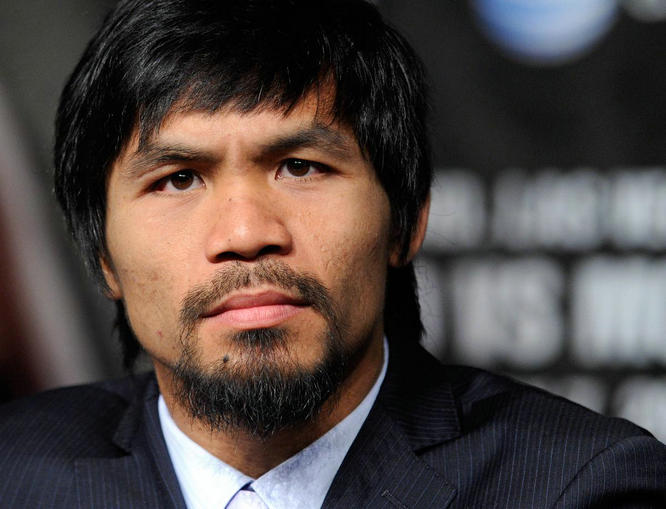
Social Responsibility and Political Journey
"My victories are not mine alone; they belong to those who, like me, have struggled in poverty." Pacquiao empathetically shared. Having risen from poverty, he understood firsthand the struggles of the marginalized. Thus, at the pinnacle of fame, he directed his light towards those still in darkness.
In 2007, he established the Manny Pacquiao Foundation, focusing on education, medical aid, and poverty alleviation. The foundation built schools, awarded scholarships, supported underprivileged students, and even distributed food and medical equipment during the pandemic, assisting thousands. Pacquiao himself actively engaged in relief efforts, interacting directly with people, embodying the principle of being "from the people, for the people."
In 2010, Pacquiao ventured further, running for and winning a seat in the Philippine House of Representatives, embarking on a political career. He brought the same tenacity from the ring to politics, working to improve infrastructure, education, and healthcare back home, advocating for his constituents. "I fought in the ring for victory, now I fight in Congress for the people's welfare," he pronounced in a speech.
What makes Pacquiao's social responsibility journey compelling is not solely his rags-to-riches story but his choices post-success. Rather than indulge in personal opulence, he chose to give back, embodying a precious "never forget your roots" ethos rare among celebrities. His actions inspire countless individuals to believe in their ability to alter their destinies and help others when capable.
Epilogue: A Legend Lives On, Spirit Eternal
Manny Pacquiao's tale is a chronicle of courage, resilience, and dreams. He authored glory in the ring with his fists and warmth in society with his heart, proving the leap from slums to global summit feasible. His accomplishments stand as a marvel in boxing history and a hymn to strivers worldwide. The name Manny Pacquiao transcends sports, symbolizing unyielding and relentless spirit. In the annals of time, his legend will perpetually shimmer, motivating generations to come.
